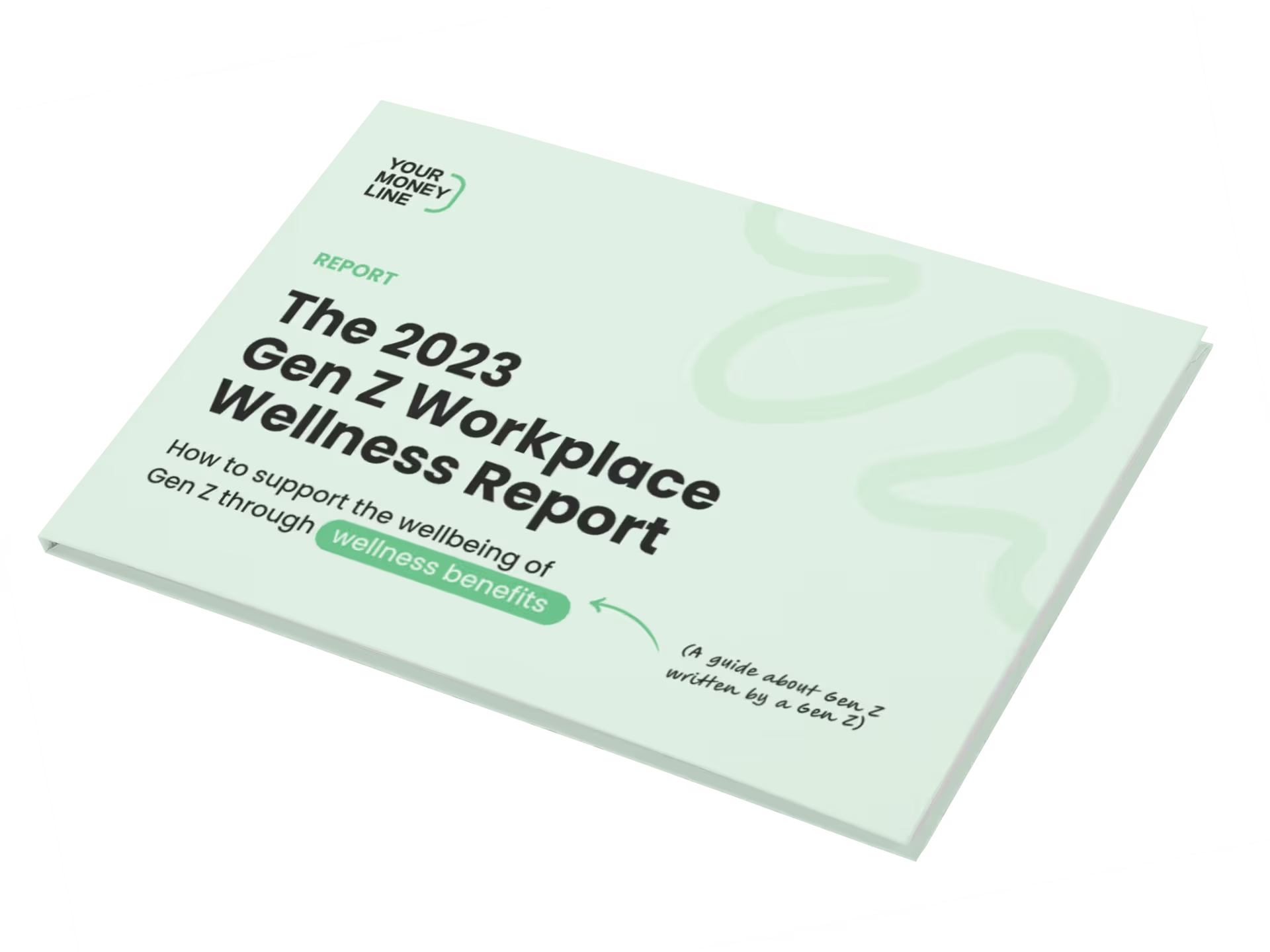Table of contents:
Introduction
Quick hits on Gen Z
Gen Z wants something different from the workplace
Gen Z is lowkey disrupting the workplace
What’s the tea on Gen Z and employee benefits?
How to support Gen Z in the workplace
Conclusion
I. Introduction — Gen Z isn’t just vibing, they’re grinding
Hi! Welcome to my little corner of the internet, consisting of all things employee wellness.
Now, I'm willing to bet if you found this, you're on a quest to decode the enigma that is Generation Z as they (we) shimmy their (our) way into the workplace.
Good news – you've landed in the right place if you're even remotely curious about Gen Z, employee benefits, or financial wellness.
Let me first introduce myself, I’m Ellie – the content marketing strategist here at Your Money Line and a member of Gen Z. Why did we write this? Well, it appears that what we (yes, my Gen Z friends and I) expect from our workplace benefits might just be a tad different from the generations that came before us.
To get the inside scoop, we surveyed 260 full-time employees, ages 22-26, from all backgrounds in the U.S. We asked about their current perks, dream benefits, the state of their piggy banks, and how their finances vibe with their overall well-being.
But before I let you know what my generation wants from the workplace, let's have a quick 'Gen Z 101'. Why? Because we're not just here to play – we're here to reshape the office landscape. And who knows? Sooner than you think, maybe already, we’re beginning to be the ones calling the shots 👀.
— Ellie
II. Quick hits on Gen Z
Gen Z? I barely know them!
⭐ We’re the generation born between 1997-2012 (ages 10-26)
⭐ We’ve grown up with smartphones, social media, and technology
⭐ We’re influencers on TikTok, Instagram, and IRL (s/o Emma Chamberlain for making it look so easy)
⭐ We’re trendsetters and trend-enders (We canceled skinny jeans)
Now, some more serious facts about us:
- We’re considered digital natives, which means we were born after the widespread adoption of digital technology¹
- We’re the most ethnically and racially diverse generation in the US to date²
- We’re on track to be the best-educated generation³
- We prefer remote work
- We’re driven, headstrong, and aren’t afraid to use our voices and stand up for what’s important to us
¹ https://www.techopedia.com/definition/28094/digital-native
III. Gen Z wants something different from the workplace
We’re stepping into the workplace with a new perspective and different expectations than those before us.
Our past experiences with economic challenges and growing up with technology greatly influence what we want from our jobs. Let’s see what drives my generation at work.
The effects of growing up during the 2008 recession and the COVID-19 Pandemic:
Gen Z was raised in the shadows of significant economic downturns. The 2008 recession left lasting impacts on our parents, influencing our early exposure to financial literacy and caution. Just as we began entering the workforce or higher education, the COVID-19 pandemic struck, bringing unprecedented challenges. Job market disruptions, remote work or study, and global economic uncertainty have deeply affected our perceptions of job security, financial stability, and long-term planning.
The impact of technology and the gig economy:
Gen Z has been shaped by technology, climate anxiety, a changing financial landscape, and the Covid-19 pandemic. However, it’s not all negative. As digital natives, we’ve come of age in a world where technology isn't just a tool; it's an integral part of life. This fluency in tech has enabled us to navigate the changing work landscape more adeptly.
What is the gig economy?
“A segment of the economy based on flexible, temporary, or freelance jobs often involving connecting clients and customers through online platforms.”⁴
⁴https://www.investopedia.com/terms/g/gig-economy.asp
The rise of the gig economy, epitomized by platforms like Uber, Airbnb, and freelance marketplaces, offers us flexibility our parents and grandparents could only dream of. While it presents challenges, like inconsistent income and lack of traditional benefits, it also provides opportunities for entrepreneurship, diverse income streams, and a work-life balance tailored to individual needs. Technology has also given us more work options than ever before, like the ability to work from anywhere, and we feel we have more of an ability/freedom to job hop.
In fact, 70% of Gen Z who say they are loyal to their companies are actively job hunting.⁵ Because we spent some of our most formative years living in a pandemic, we crave work-life balance, flexibility, and hunger to find what we are passionate about, which means hopping from job to job.
⁵https://www.businessinsider.com/gen-z-happy-job-hopping-quit-without-backup-oliver-wyman-2023-1
We’re navigating an unprecedented socio-economic landscape, molded by past generations' experiences and contemporary challenges. Our employment journey is a blend of caution, born from global recessions, and innovation, fueled by technology and an evolving job market.
IV. Gen Z is lowkey disrupting the workplace
Gen Z has slightly different workplace expectations
We tend to define life and success differently than those before us, which leads us to have different expectations. Although salary is an important aspect of a job, Gen Z seeks roles that have value and contribute to the greater good. We care a lot about societal challenges such as climate change, sustainability, hunger, etc., and search for ways our work aligns with solving these issues.
Our strong preference for remote work and flexibility due to growing up in the digital age also means we can work efficiently from anywhere. Gen Z doesn’t love the 9-5 and prefers to find jobs with more flexibility. A study by Upwork states nine out of ten Gen Zers want remote work to stay.⁶ We look for roles that allow us to determine when and where we work, ensuring we produce our best results without being confined to a specific location.
As Gen Z becomes an increasingly dominant force in the labor market, it's clear that our priorities are steering the professional world toward a more holistic, value-driven, and flexible future.
⁶https://www.upwork.com/blog/gen-z-workforce
V. What’s the tea with Gen Z and wellness benefits?
The short answer is we care a lot about our overall wellness and expect our employers to as well.
Top three key findings from our research
- There are high levels of financial stress among Gen Z employees
- Financial concerns are negatively impacting overall wellness
- Gen Z employees want more financial wellness benefits to help address this
Top three wanted wellness initiatives
- Mental health benefits — 60%
- Fitness benefits — 48%
- Financial coaching/planning benefits — 35%
Additional insights:
Financial Stress Levels
- 42% feel financially stressed at work on a frequent basis
- 65% say their financial life impacts overall wellness significantly
- Top financial concerns are around savings, expenses, and retirement
Desired Financial Wellness Benefits
- Top benefits employees want are financial coaching and education
- Preferred format is expert guidance via phone, email, text
- Interest in financial education via online courses, videos
Current Wellness Offerings
- Majority feel current benefits only moderately support wellness
- This aligns with high workplace stress levels reported
- Over 50% of Gen Z has explored other jobs recently
The majority of employees feel their workplace benefits only support their overall wellbeing a little to a moderate amount. Just over 20% said benefits support their wellbeing a great deal. There is room for improvement when it comes to workplace benefits enhancing overall wellbeing.
Nearly half of respondents experience stress at work daily or weekly. Only around 12% feel stressed less than once a month. There appear to be significant levels of workplace stress across the board.
Over 50% of employees have explored outside job opportunities in the last 6 months, with a quarter doing so daily or weekly. There seems to be meaningful intent from employees to find alternate employment options.
65% experience a great deal or a lot of stress related to their finances. Financial concerns are a top source of stress for employees both in and outside of work.
The top wellness initiatives employees want to see are mental health benefits, fitness benefits, and financial coaching. There is clearly demand among Gen Z for a more holistic approach to benefits and wellbeing offerings.
When ranked by preference, mental health benefits were on top again, but financial coaching/planning outranked fitness benefits. Aligning wellness offerings to these top priorities could improve overall engagement with benefits.
A quick aside: How mental and financial health relate
Multiple studies link financial stress to our mental health. Knowing how to deal with financial problems is essential not just for one's economic stability but also to address mental distress. All that to say—giving employee tools reduce money stress should be a key component in addressing mental wellbeing.
As we begin our careers and become financially independent, we are experiencing some pretty tough financial challenges with high inflation, high cost of living, expensive college costs, and the competitive job market. Sometimes, more often than not, even just our day-to-day expenses are tough, and thinking and planning for the future seems nearly impossible.
Gen Z has some financial worries
As we navigate these complexities of modern-day economics, three primary worries stand out:
Emergency funds
In an unpredictable world, the importance of having a financial safety net cannot be overstated. Gen Z's concern about lacking this cushion underscores their desire for financial stability and preparedness against unforeseen challenges.
Meeting monthly expenses
Closely related to the first concern is the fear of being unable to meet monthly expenses. With rising living costs and many Gen Z members being early in their career paths, ensuring they can cover their basic needs every month is a pressing issue.
Debt and student loans
The burden of debt, particularly student loans, is a significant stressor for Gen Z. With higher education costs skyrocketing, many members of this generation find themselves grappling with substantial loan repayments and balancing education, career aspirations, and financial health.
VI. How to support Gen Z in the workplace
Takeaways for employers
While Gen Z is not a monolith-taken as a whole, we do expect unique and different things than the generations before us. If employers don’t pay attention to the needs and wants of Gen Z, they could see high levels of turnover, poor performance, poor work culture, and an inability to attract this generation.
So, how can companies appeal to and engage with Gen Z?
Share information with us to build trust — Gen Z has grown up in the digital age. If you’ve made it this far, you’ve read the term digital age or digital native over and over again. It’s because it has greatly (obviously) impacted us! Because we have lived in the world of social media and technology since we could walk, transparency and communication are a priority. Building trust and connection with us is the first step to giving us a sense of importance and belonging in the workplace. Giving us access to information, even if it doesn’t seem important to share, will alleviate anxiety and allow us to feel in control.
Incentivize us with career growth paths — With the state of the economy and layoffs seemingly happening everywhere, Gen Z is concerned for job security and advancement. Showing us from the beginning how our work will impact the company and how we can grow within our role straight from the gecko will help us feel in control of our future. Continually conversing with Gen Z about salary, career progression, and professional development will give us a sense of purpose and create an engaged, productive, an happy work environment for everyone.
Allow room for workplace autonomy — As mentioned in my facts about Gen Z, we’re driven, headstrong, and aren’t afraid to use our voices and stand up for what’s important to us. Because of this, we love to make decisions on our own, experiment, and figure out how to do this whole work thing by ourselves sometimes. We need space to make our own mistakes, and figure out what we love and don’t love to do, all while knowing there is help if needed.
Prioritize wellness and mental health — Gen Z is much quicker to up and leave a job if we’re unhappy, so prioritizing wellness and mental health is crucial to supporting them in the workplace. From our survey, Gen Z ranked mental health benefits as the number one benefit they want in our workplace. Organizations and leaders must create a wellness culture to support their employees and engage, retain, and see better work from their employees.
Provide benefits we actually want — The benefits game is ever-evolving, and with Gen Z about to be the majority of the workforce, it’s important to provide the benefits we want. Mental, physical, emotional, and financial health are all really important to us. We believe our employers are responsible for providing benefits to support our well-being. As evident from our survey, Gen Z wants mental health, physical, and financial health benefits, and overall more support from their employer.
Here are a few benefits to take into consideration that will attract and retain Gen Z:
- Mental health — This can be promoted through regular counseling sessions, workshops on stress management, and creating a supportive work environment.
- Physical health — Apart from health insurance benefits, companies can provide gym memberships, organize team sports events, or even introduce wellness challenges.
- Emotional health — Team-building activities, workshops on emotional intelligence, and fostering a positive workplace culture can be beneficial.
- Financial health — Aside from traditional retirement offerings and EAPS, companies can also provide their employees with financial coaching and planning services. This generation wants to enhance financial wellness offerings to address top concerns, prioritizing expert guidance delivered via technology, and offering engaging financial education through online courses.
VII. Conclusion
One might say (spoiler alert me, I will say this) Gen Z is a force to be reckoned with, and as we begin to climb the corporate ladder, find our passions, and make a difference in the world, the best thing our employers can do is take the time to get to know us, understand us, and at the end of the day, provide the employee benefits we want. Before you know it, we will be kicking butts and taking names, if we aren’t already, which don’t put that past us either 🫣.
If you got anything out of reading this, I hope it’s that, as Gen Z, we just want to be recognized as a whole person, our entire well-being is extremely important to us, we care about our finances (hello retirement, we do think about you 👴👵), and we’re here to make ourselves known. At the end of the day, we want our employers on our side, which means invest in our success, communicate with us, and open yourselves up to learning a thing or two from us.






